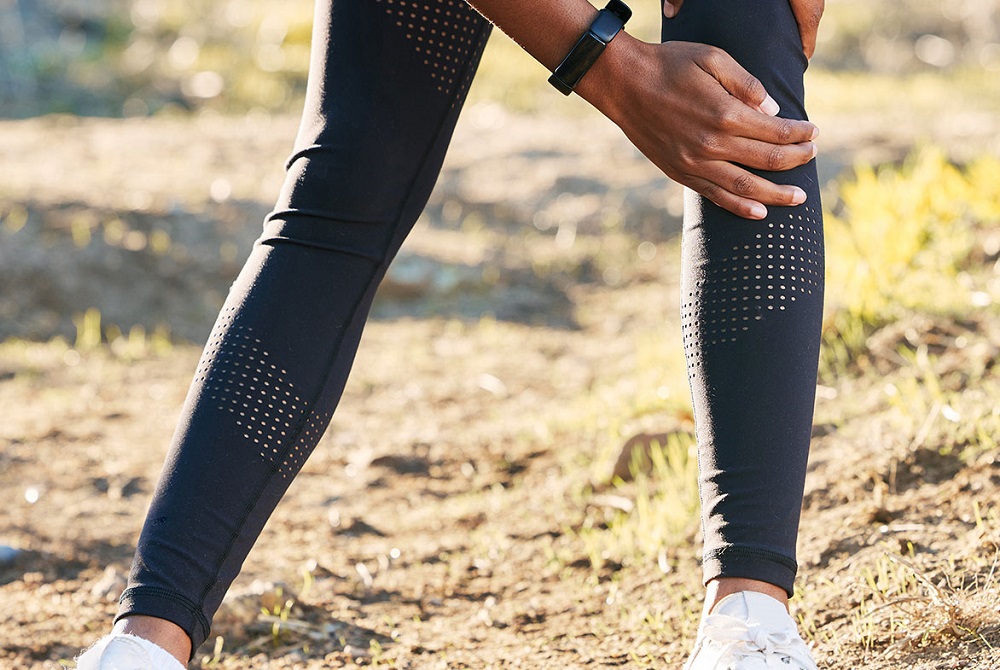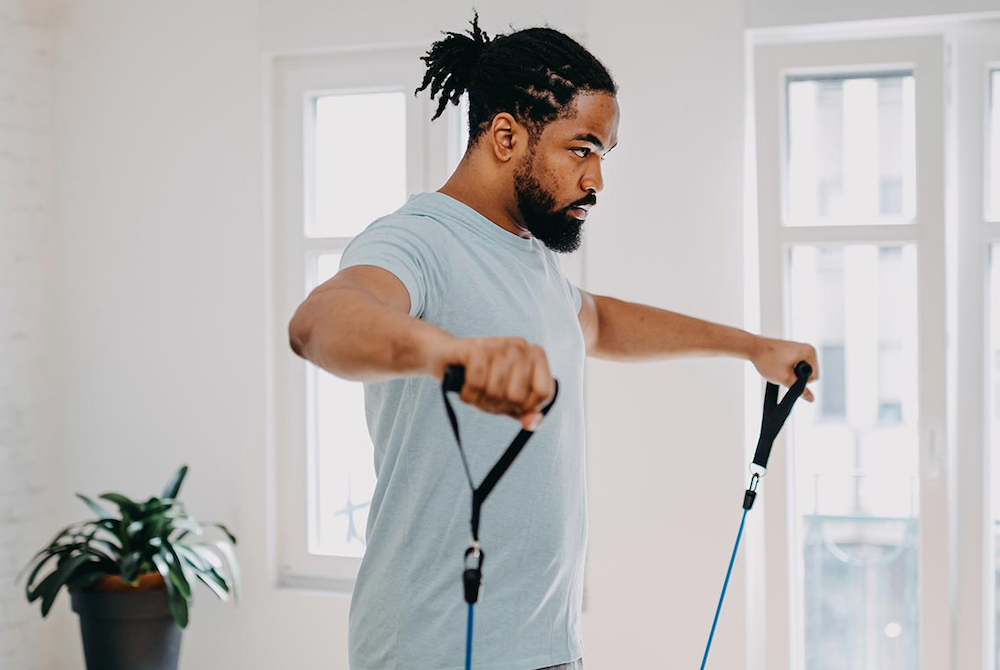
Snap, Crackle & Pop: Why Do My Knees Make Noises - And Should I See a Doctor?
April 5, 2022
Do you ever just go about your daily life and then, seemingly out of nowhere, your knee makes a noise?
You might call it a weird idiosyncrasy and not think twice about it—or you might turn to the Internet to try and find all of the potential issues that might be wrong with your knee.
But if your knee pops or cracks once in a while, it’s usually no cause for concern. After all, joints sometimes make noises, and knees are no exception (especially when you squat or sit down.)
“Infrequent knee pops and cracks are more common in the younger population, says Nancy White, M.D., a sports medicine physician at Henry Ford Health. “When you feel that ‘pop,’ it means your kneecap was pulled a bit outside of where it’s supposed to be, and so it’s correcting itself and getting back into position. You can kind of feel that something moved.”
If, however, pain or swelling accompanies a noisy knee, you should have it evaluated by a sports medicine provider. And if your knee is popping or cracking regularly, that's another sign you should have it checked out.
“If you let it go, your knee could get worse,” says Dr. White. “There are recommendations a doctor can make to prevent this from happening, such as strengthening and flexibility exercises.”
What Is Knee Crepitus?
If your knee sounds like Rice Krispies crackling (or you experience a grinding sensation) it likely means you have knee crepitus, which can signify the beginning of osteoarthritis behind the kneecap.
“Knee crepitus is primarily caused by an issue called patellofemoral dysfunction,” says Dr. White. That sounds like a mouthful, but it means that your knee isn’t tracking straight up and down like it’s supposed to.
“There’s cartilage on the back of your kneecap and on the front part of your thigh, and the cartilage on the front part of your thighbone makes a groove so the kneecap can glide straight up and down in a floating position,” says Dr. White. “If the cartilage is worn down (and inflamed, worn-down cartilage signifies osteoarthritis), the kneecap can’t smoothly glide up and down, causing knee crepitus.”
If you are experiencing knee crepitus, you should see a sports medicine primary care physician, especially if it is accompanied by pain. They can recommend a variety of treatments, such as physical therapy and cortisone injections.
Still not sure if your noisy knees are cause for concern? When in doubt, call your doctor. After all, the sooner your doctor can examine it, the sooner you can prevent an issue from getting worse.
To learn more about your orthopedic condition or to find a provider, visit henryford.com/ortho.
Dr. Nancy White is a sports medicine physician with Henry Ford Health. She sees patients at Henry Ford Medical Center – Novi, and Henry Ford Medical Center – Bloomfield Township.

How To Warm Up Correctly Before Playing Different Sports
July 10, 2024
When you see professional athletes gearing up to race or getting ready to take the field, you’ll notice that they’re always in motion. That’s because they are warming up in preparation for going all out.
 And there’s a good reason why you’ll never see a pro go straight from the bench into a full sprint. “You need to allow your muscles to gradually accept the demands of your activity,” says Jennifer Burnham, a certified athletic trainer at Henry Ford Health. “Otherwise you risk causing an injury.”
And there’s a good reason why you’ll never see a pro go straight from the bench into a full sprint. “You need to allow your muscles to gradually accept the demands of your activity,” says Jennifer Burnham, a certified athletic trainer at Henry Ford Health. “Otherwise you risk causing an injury.”
Why You Should Warm Up
As the name implies, a warmup is a series of movements designed to warm up your muscles. “You want to increase blood flow to your muscles and loosen up and lubricate your joints,” says Burnham. “And you need to do it gradually, so that your body has time to adapt to the increasing intensity.”
Warming up involves more than just stretching. According to Burnham, studies have actually shown that holding a static stretch when muscles are cold can decrease performance. “Instead, before activity you want to do a dynamic warmup that incorporates movement as well as some gentle stretching."
Your warmup only needs to take 5 to 10 minutes. When deciding what to do, think about the movements you’ll be doing in your activity and which muscles and joints are most involved. Then choose movements that slowly get them warmed up and primed for more intense action.
How To Warm Up For Different Activities
No matter your sport, the warmup before your workout should include some exercises to activate and engage your core (the abdominal and back muscles). “Waking up those muscles helps decrease injury potential,” says Burnham. She suggests incorporating bridges and mini squats (no deeper than 45 degrees) into your warmup routine. To do a bridge, lie on your back, knees bent, feet flat on the floor. Tighten your stomach muscles and squeeze your butt as you lift your hips up to form a straight line from knees to shoulders.
The rest of your warmup can be more specific to muscles and movements of your planned activity.
Running
Before a run, or even a jog, you want to warm up all the muscles and joints from the waist down.
- Rotate your hips (lift your knee up and do some circles in both directions to move the joint) and ankles (circle one foot at a time both clockwise and counter-clockwise).
- Get powerful muscles like your glutes and quads ready with high knees and butt kicks.
- Walk on your toes and then on your heels to warm up shin and calf muscles.
- When you’re ready to run, start off slowly and gradually increase your speed.
Racquet sports
You still need to warm up your lower body using the same moves as the running warmup. But you’ll want to add in others specific to the upper body movements of tennis, pickleball or other racket sports.
- Warm up shoulders with big arm circles both forwards and backwards
- Circle your hands in both directions to get wrists ready for action
- Lunge forward and rotate your upper torso to increase your spine mobility
Basketball, soccer and football
You want to make sure your lower body has time to adapt to the demands of sports that require bursts of sprinting and quick shifts of direction. Your warmup should gradually increase in speed and intensity as you move your body in all directions:
- Side shuffles while swinging your arms (shuffle in both directions)
- Grapevines in both directions
- Skip forward, lifting knees high, then skip backward
Swimming
Prepping your body for a swimming workout means warming up your arms, shoulders and upper back.
- Circle arms backwards and forwards
- Use a light resistance band to do shoulder rows
- Use a light resistance band or light dumbbell and lift straight arms up to shoulder height in front and to your sides
- Start with an easy tempo freestyle swim before going into more dynamic strokes like butterfly
Jennifer Burnham is an athletic trainer who sees patients at the Henry Ford Center for Athletic Medicine in Detroit.
To find a sports medicine provider at Henry Ford Health, visit henryford.com/athletes or call 313-651-1969.


